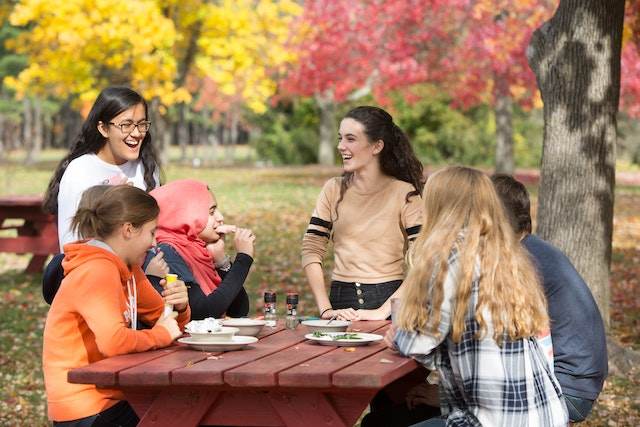Access to food is a right, but that doesn’t mean we all access it the same way. The UK has massive inequalities, and one place this is glaringly obvious is in the food sector, where, depending on where you were born and who your parents are, you may not have the same opportunity to access nutritious, affordable food you love to eat. Today, we explore why food access is such a problem and how diversity in the industry will make a better food system for everyone involved.
How Food Access is different for everyone
No matter who you are, we all need food to live. However, the food landscape can look very different depending on where you live, who you are and what you can afford.
One of the main barriers to accessing good quality food is affordability. The cost of living continues to rise, and food prices have soared. For those with the lowest incomes, which often includes our most marginalised communities, simply buying any food is becoming a significant burden on the household budget. This can be made even worse if living in food deserts. Food deserts are defined as urban areas where residents do not have access to an affordable and healthy diet. More than 1.2 million people in deprived areas live in a food desert in the UK. Even if people have the financial resources, they may not have the time or transportation to shop further afield where food is cheaper and healthier. Food Insecurity is on the rise in the UK. It is more likely to affect people from Black, Asian and Minority Ethnic groups (BAME). According to the Food Foundation’s most recent Food Insecurity Tracking, BAME groups were more likely to be food insecure than White ethnic groups, with 26.9% of BAME households experiencing food insecurity against 18.5% of white households. Inequalities in food access lead to poorer health, educational and economic outcomes, affecting our communities, not just the individual.
Of course, it’s not just about being able to buy your own food but growing it as well. Farming and the countryside have traditionally been seen as a white and wealthy space. In England alone, 50% of the land is owned by 1% of the population, and most agricultural land is passed on through inheritance. If you live in an economically deprived area, you have the least access to quality green spaces. These two facts mean that if you have a low income and/or are part of a BAME group, you have the poorest chance of being involved in growing food and gaining access to space to grow. Not to mention other time, money, language and cultural barriers, which may also stop the ability to pursue education or training in the sector. Access to food should be equal because food is a right, but there are also countless benefits when we make the food sector as diverse as a well-balanced diet.
Why diversity is better for food
Healthier food equals healthier people, and if we are to improve health outcomes for all people, we need to help with access to culturally appropriate foods. Culturally appropriate foods or culturally preferred foods are safe and nutritious foods that meet people’s diverse tastes and needs based on their cultural identity. Research suggests that when you enjoy your food, you absorb more of the nutrients within it. When people can eat their favourite foods, which often remind them of family, friends and celebration, we are helping support their happiness as well as their health. United Women’s Affiliation, a Sheffield-based charity fighting social isolation in Sheffield’s BAME & refugee community, is an excellent example. Their community allotment is growing mainly Sub-Saharan vegetables, which will feed families and build skills and confidence for their volunteers. Whenever we improve our neighbours’ health, we are helping the community as a whole by reducing visits to the NHS for physical and mental health.
Diversity in work also has significant benefits for businesses and the local economy. Increased diversity in the workforce, especially in leadership roles, has been shown to improve profits, speed up decision-making and encourage better innovation. We could reap these benefits if we supported education and training for underrepresented people in farming and helped support young people into work. We could grow our sustainable food sector, create the next generation of innovative farmers and improve food access for everybody in Sheffield.
Encouraging & Celebrating Diversity
So, how do we help create a more diverse food sector? We address the barriers that low-income families and BAME groups face and provide opportunities for everyone to get involved.
- Access to space – Whether people need land for growing or kitchens for feeding their community, there are several organisations helping communities access these spaces, including Food Works, Green City Action, Green Estate, Sheffield City Council, Sheffield Community Land Trust, Regather, Open Kitchen Social Club and Chef’s Counter.
- Improving information for all – Everyone needs to know where they can access food and how they can do it, whether that’s farmers markets, community pantries or allotments. Volunteer Action Sheffield, Sheffield City Council and Citizens Advice Sheffield are mapping food provision across the city so everyone knows where to go.
- Provide Education and Training – If we can support and fund food, farming and horticulture education, we can build a more diverse mix of future farmers. We are seeing fantastic educational programmes across the city and in schools with organisations like Grow UK, Heeley City Farm, Leaf + Shoot, Learn Sheffield, Moss Valley Market Garden, Percy Street CIC, Schools’ Climate Education South Yorkshire and The Sheffield College.
- Connect Communities – Part of ShefFood’s role is encouraging collaboration between food businesses and organisations. On October 12th, our partnership coordinator, Rachael, will attend a Diversity and inclusion workshop in Bristol as part of the Synergy Project. The project is all about sharing learning between food partnerships at different stages of development, and helping our communities connect is a big part of what we hope to learn.
Of course, we also must remember to celebrate the fantastic achievements that diversity has brought to our city of food already. Sheffield has restaurants and cafes that feature food from across the globe, from Indian to Thai, Mexican to Portuguese; there are lovely eateries wherever you go. Community groups and charities like Shipshape and Open Kitchen Social Club feed and support marginalised communities that often fall through the gaps of government support. Thousands of people from all walks of life volunteer and work in the food, farming and hospitality sectors to create a more vibrant and productive food system. Just like the biodiversity we want to see in our wildlife, we need to encourage and celebrate the diversity of Sheffield folks in food.

